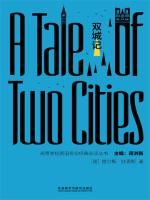Two Cities, Two Men
A tale of two cities, a novel by Charles Dickens, narrates a story set in the late 18th century against the background of the French Revolution. Charles Dickens creates the novel to warn the English rulers at that time to learn the lesson from the French Revolution and to avoid violence and blood.
The book is perhaps best known for its opening lines, “It was the best of times, it was the worst of times, it was the age of wisdom, it was the age of foolishness, it was the epoch of belief, it was the epoch of incredulity, it was the season of Light, it was the season of Darkness, it was the spring of hope, it was the winter of despair, we had everything before us, we had nothing before us, we were all going direct to Heaven, we were all going direct the other way.”
I have heard about the speech—its Chinese version—since I was in junior high school, but I haven’t read the English novel until this summer vacation. After finishing reading the original-language version, I find it more profound and touched with more artistic and passionate appeal than the translation version, despite that the latter is excellent. In my opinion, the difference arises from the language. The novel is written originally in English, and literary appeal is delivered through the use of language to a large extent, so it is usual that the original work is more amazing than the translation.
The novel develops with a series of flashbacks, hints and foreshowing details, creates ups and downs in the plot, and attracts me so deeply that I can’t help stopping reading it. The climax plot is when a letter is read aloud in court indicting Darnay as a member of a cruel aristocratic lineage, but the novel impresses me most with Sydney Carton’s sacrifice for Lucie by receiving death sentence in Darnay’s place. Even at the end of his life, Mr. Carton kindly and benevolently helps a young girl by comforting and encouraging her to face death. He himself faces death so calmly and firmly that I, as a reader, can’t calm myself after reading the novel because of his great love.
That is the very theme of the novel—love and sacrifice. Owing to Lucie’s love, her father Mr. Manette finally recovers from his mental disease resulted from the imprisonment of 18 years; owing to Miss Pross’ love, Lucie—in the former’s word, “her ladybird”—is able to grow up and be educated as a considerate and philanthropic person; also owing to Miss Pross’ vigorous tenacity of love— “always so much stronger than hate”, she fights with Madame Defarge and defeats her; and owing to his deep love for Lucie, Mr. Carton determined to sacrifice his own life to exchange Darnay’s survival. In the novel’s Prologue, Charles Dickens explains how he got the inspiration for this story. He had recently stared in a Wilkie Collins play called The Frozen Deep in which Dickens played the role of a man who had sacrificed his own life so that his rival could have the woman they both loved. Maybe the real-life inspiration is part of what makes the events of this story so emotionally strong.
In short, “two cities” refer not only to the cities London and Paris, but also two men—Darnay and Carton and the two lives of them.



 京公网安备 11010802032529号
京公网安备 11010802032529号